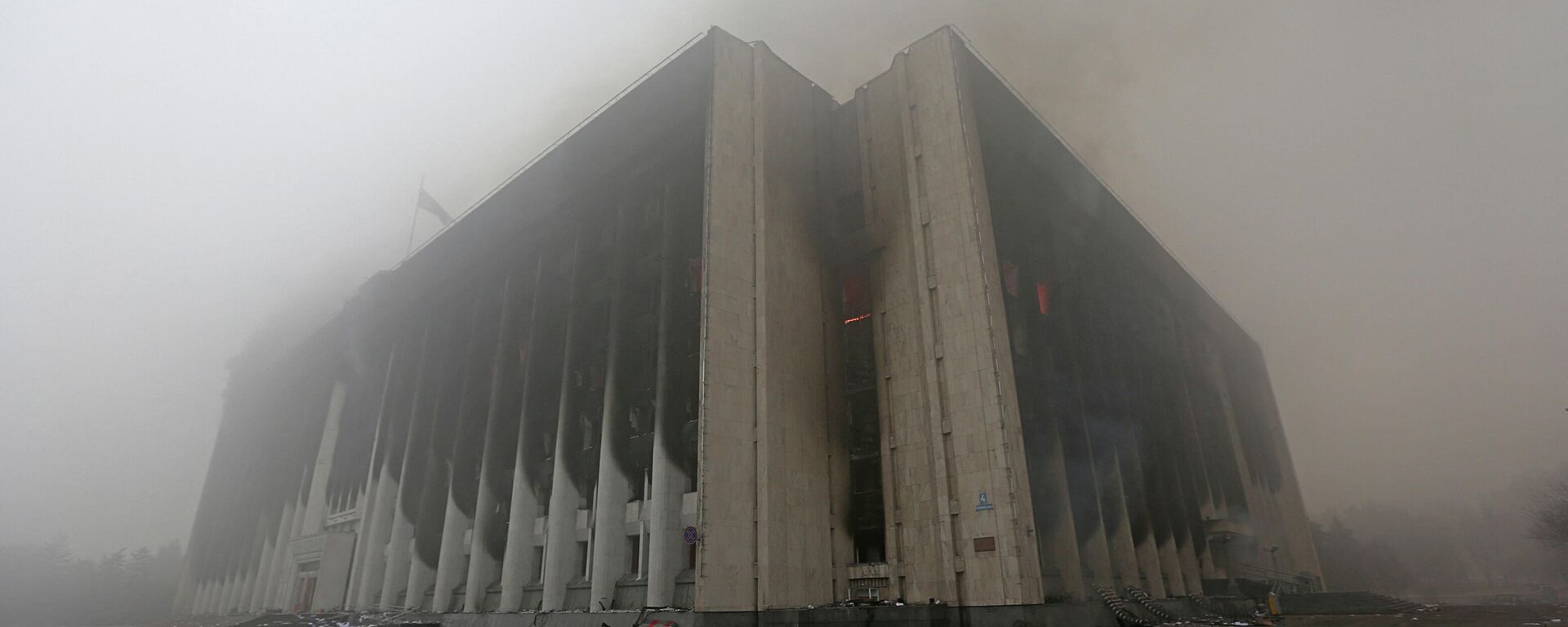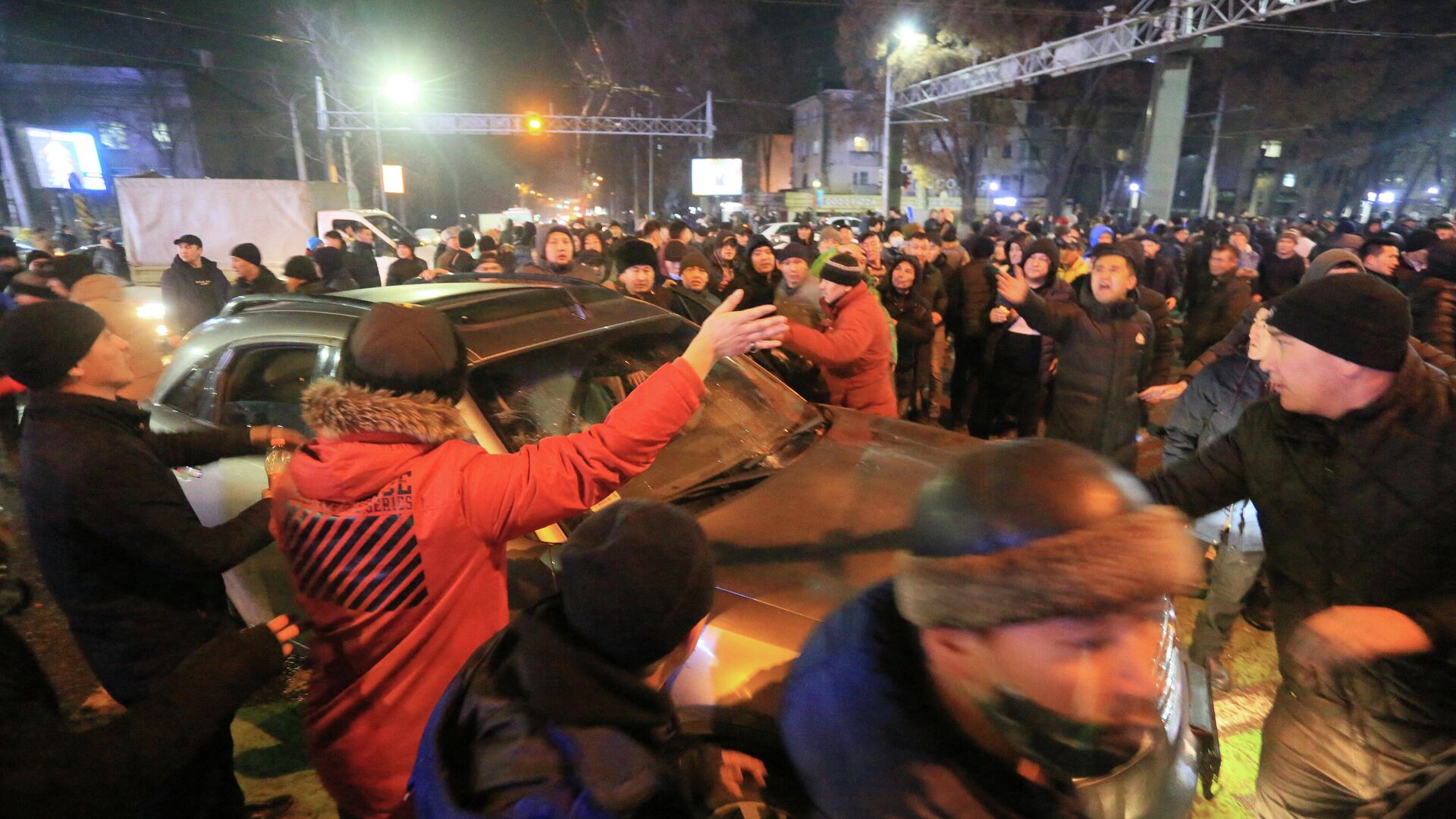https://sputnikglobe.com/20220108/bandits-in-kazakhstan-prepared-for-mass-rallies-had-foreign-backing-cis-executive-committee-says--1092116644.html
Bandits in Kazakhstan Prepared for Mass Rallies, Had Foreign Backing, CIS Executive Committee Says
Bandits in Kazakhstan Prepared for Mass Rallies, Had Foreign Backing, CIS Executive Committee Says
Sputnik International
Kazakhstan has been rattled by mass protests for several days. After a corresponding request from President Tokayev, the CSTO decided to send its peacekeeping forces to Kazakhstan, with the contingents primarily tasked with guarding essential military and government infrastructure.
2022-01-08T13:54+0000
2022-01-08T13:54+0000
2022-01-08T14:57+0000
protests in kazakhstan
cis
kazakhstan
world
https://cdn1.img.sputnikglobe.com/img/07e6/01/08/1092117083_0:160:3073:1888_1920x0_80_0_0_42e3219376c892c8ebe4f733e157c5eb.jpg
Mass unrest in Kazakhstan was prepared in advance in order to destabilise the situation in the country, and its organisers had foreign backing, according to CIS Executive Commissioner Sergei Lebedev.According to him, the Kazakh authorities' actions to restore order and stability in the country are "timely and reasonable".He also said the CIS Executive Committee is confident that the joint efforts by people from Kazakhstan and "their friends from the CIS countries" will soon lead to the restoration of peace in the Central Asian nation.Lebedev expressed hope that the situation in the Kazakh city of Almaty will return to normal in the next few weeks, which will make it possible to organise CIS events there. This year, Kazakhstan is chairing the CIS, which includes Armenia, Azerbaijan, Belarus, Kazakhstan itself, Kyrgyzstan, Moldova, Russia, Tajikistan, and Uzbekistan.Foreign Interference The suggestions of possible foreign backing of the riots in Kazakhstan have been voiced since the first days of the unrest. On 5 January, President Kassym-Jomart Tokayev said during one of his addresses to the nation that there is a group of "financially motivated" plotters with a carefully masterminded plan behind the protests, vowing decisive actions against any criminals. On Friday, Russian Ambassador to the US Anatoly Antonov said that Moscow views the tense situation in Kazakhstan as "externally provoked, violent developments in a friendly country aimed at disrupting its security and integrity".CSTO MissionThe protests in Kazakhstan started on 2 January, prompted by a surge in gas prices. Demonstrations first began in the southwestern areas of the country, but then they quickly spread to other cities, with some of the protests evolving into violent riots. According to Tokayev, among those who had launched "at least six waves of attacks" on Almaty over the past few days were militants that did not speak the Kazakh language. He noted that the assailants, whom he called terrorists and bandits, were well-trained and well-organised, and likely received orders from a special centre. The Kazakh president accused the militants of beating and killing police officers and soldiers, setting fire to administrative buildings, looting private premises and shops, killing ordinary citizens, and raping young women.On 6 January, following a request for help from Tokayev, the Collective Security Treaty Organisation (CSTO) decided to send its peacekeeping contingents to protest-hit Kazakhstan. The bloc includes such post-Soviet nations as Russia, Belarus, Armenia, Kazakhstan, Kyrgyzstan, Tajikistan, and Uzbekistan. The peacekeeping forces' main task is to maintain the security of essential military and government infrastructure.
https://sputnikglobe.com/20220108/russia-believes-kazakhstan-civil-unrest-provoked-by-external-forces-to-disrupt-security--integrity-1092105067.html
kazakhstan
Sputnik International
feedback@sputniknews.com
+74956456601
MIA „Rossiya Segodnya“
2022
News
en_EN
Sputnik International
feedback@sputniknews.com
+74956456601
MIA „Rossiya Segodnya“
Sputnik International
feedback@sputniknews.com
+74956456601
MIA „Rossiya Segodnya“
kazakhstan, protests in kazakhstan, bandits in kazakhstan, csto peacekeepers in kazakhstan, cis executive commissioner, sergei lebedev,
kazakhstan, protests in kazakhstan, bandits in kazakhstan, csto peacekeepers in kazakhstan, cis executive commissioner, sergei lebedev,
Bandits in Kazakhstan Prepared for Mass Rallies, Had Foreign Backing, CIS Executive Committee Says
13:54 GMT 08.01.2022 (Updated: 14:57 GMT 08.01.2022) Kazakhstan has been rattled by mass protests for several days. After a corresponding request from President Tokayev, the CSTO decided to send its peacekeeping forces to Kazakhstan, with the contingents primarily tasked with guarding essential military and government infrastructure.
Mass unrest in Kazakhstan was prepared in advance in order to destabilise the situation in the country, and its organisers had foreign backing, according to CIS Executive Commissioner Sergei Lebedev.
"It is obvious today that the destructive elements, the bandits were preparing for mass rallies in advance to destabilize the country and had foreign support," Lebedev said. "These provocateurs, guides, and sponsors of the so-called 'colour revolutions' and riots in the CIS these days declare with feigned pride their leading role in criminal acts in the cities of Kazakhstan".
According to him, the Kazakh authorities' actions to restore order and stability in the country are "timely and reasonable".
He also said the CIS Executive Committee is confident that the joint efforts by people from Kazakhstan and "their friends from the CIS countries" will soon lead to the restoration of peace in the Central Asian nation.
Lebedev expressed hope that the situation in the Kazakh city of Almaty will return to normal in the next few weeks, which will make it possible to organise CIS events there.
This year, Kazakhstan is chairing the CIS, which includes Armenia, Azerbaijan, Belarus, Kazakhstan itself, Kyrgyzstan, Moldova, Russia, Tajikistan, and Uzbekistan.
The suggestions of possible foreign backing of the riots in Kazakhstan have been voiced since the first days of the unrest. On 5 January, President Kassym-Jomart Tokayev said during one of his addresses to the nation that there is a group of "financially motivated" plotters with a carefully masterminded plan behind the protests, vowing decisive actions against any criminals.
On Friday, Russian Ambassador to the US Anatoly Antonov said that Moscow views the tense situation in Kazakhstan as "externally provoked, violent developments in a friendly country aimed at disrupting its security and integrity".

8 January 2022, 00:25 GMT
The protests in Kazakhstan started on 2 January, prompted by a surge in gas prices. Demonstrations first began in the southwestern areas of the country, but then they quickly spread to other cities, with some of the protests evolving into violent riots.
According to Tokayev, among those who had launched "at least six waves of attacks" on Almaty over the past few days were militants that did not speak the Kazakh language. He noted that the assailants, whom he called terrorists and bandits, were well-trained and well-organised, and likely received orders from a special centre.
The Kazakh president accused the militants of beating and killing police officers and soldiers, setting fire to administrative buildings, looting private premises and shops, killing ordinary citizens, and raping young women.
On 6 January, following a request for help from Tokayev, the Collective Security Treaty Organisation (CSTO) decided to send its peacekeeping contingents to protest-hit Kazakhstan. The bloc includes such post-Soviet nations as Russia, Belarus, Armenia, Kazakhstan, Kyrgyzstan, Tajikistan, and Uzbekistan. The
peacekeeping forces' main task is to maintain the security of essential military and government infrastructure.



